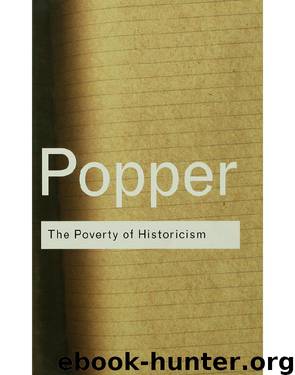The Poverty of Historicism by Popper Karl

Author:Popper, Karl [Popper, Karl]
Language: eng
Format: epub
Publisher: Taylor and Francis
Published: 0101-01-01T00:00:00+00:00
26 Are Generalizations Confined to Periods?
The fact that I have discussed the problem of social experiments before discussing at any length the problem of sociological laws, or theories, or hypotheses, or ‘generalizations’, does not mean that I think that observations and experiments are in some way or other logically prior to theories. On the contrary, I believe that theories are prior to observations as well as to experiments, in the sense that the latter are significant only in relation to theoretical problems. Also, we must have a question before we can hope that observation or experiment may help us in any way to provide an answer. Or to put it in terms of the method of trial and error, the trial must come before the error; and as we have seen (in section 24), the theory or hypothesis, which is always tentative, is part of the trial, while observation and experiment help us to weed out theories by showing where they err. I do not believe, therefore, in the ‘method of generalization’, that is to say, in the view that science begins with observations from which it derives its theories by some process of generalization or induction. I believe, rather, that the function of observation and experiment is the more modest one of helping us to test our theories and to eliminate those which do not stand up to tests; even though it must be admitted that this process of weeding out not only checks theoretical speculation, but also stimulates it to try again—and often to err again, and to be refuted again, by new observations and experiments.
In this section, I shall criticize the historicist contention (see section 1) that in the social sciences the validity of all generalizations, or at least of the most important ones, is confined to the concrete historical period in which the relevant observations were made. I shall criticize this contention without first discussing the question whether or not the so-called ‘method of generalization’ is defensible, in spite of my conviction that it is not; for I think that the historicist contention can be refuted without showing that this method is invalid. The discussion of my views on this method, and on the relations between theory and experiment in general, can therefore be postponed. It will be taken up again in section 28.
I begin my criticism of the historicist contention with the admission that most people living in a certain historical period will incline to the erroneous belief that the regularities which they observe around them are universal laws of social life, holding good for all societies. Indeed, we sometimes only notice that we are cherishing such beliefs when, in a foreign country, we find that our habits regarding food, our greeting-taboos, etc., are by no means as acceptable as we naively assumed. It is a rather obvious inference that many of our other generalizations, whether consciously held or not, may be of the same kind, though they may remain unchallenged because we cannot travel into another historical period.
Download
This site does not store any files on its server. We only index and link to content provided by other sites. Please contact the content providers to delete copyright contents if any and email us, we'll remove relevant links or contents immediately.
The remains of the day by Kazuo Ishiguro(8999)
Tools of Titans by Timothy Ferriss(8394)
Giovanni's Room by James Baldwin(7346)
The Black Swan by Nassim Nicholas Taleb(7129)
Inner Engineering: A Yogi's Guide to Joy by Sadhguru(6794)
The Way of Zen by Alan W. Watts(6614)
The Power of Now: A Guide to Spiritual Enlightenment by Eckhart Tolle(5781)
Asking the Right Questions: A Guide to Critical Thinking by M. Neil Browne & Stuart M. Keeley(5775)
The Six Wives Of Henry VIII (WOMEN IN HISTORY) by Fraser Antonia(5515)
Astrophysics for People in a Hurry by Neil DeGrasse Tyson(5189)
Housekeeping by Marilynne Robinson(4447)
12 Rules for Life by Jordan B. Peterson(4304)
Ikigai by Héctor García & Francesc Miralles(4274)
Double Down (Diary of a Wimpy Kid Book 11) by Jeff Kinney(4271)
The Ethical Slut by Janet W. Hardy(4251)
Skin in the Game by Nassim Nicholas Taleb(4248)
The Art of Happiness by The Dalai Lama(4130)
Skin in the Game: Hidden Asymmetries in Daily Life by Nassim Nicholas Taleb(4006)
Walking by Henry David Thoreau(3962)
